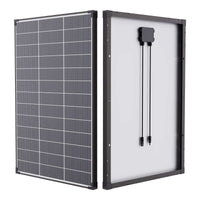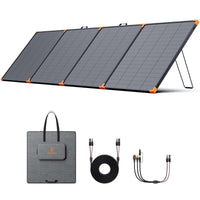Propane vs. Solar vs. Natural Gas Generator — Which Is Best for You?
From hurricanes in Florida to blackouts in California, reliable backup power is no longer a luxury—it's a necessity. But which generator should you choose? Propane, natural gas, or solar?
In this guide, we’ll explore how each type works, compare their pros and cons, and help you choose the best option for your home, RV, or off-grid life.

⚙️ How Each Generator Works
🔥 Propane Generator
Uses liquid propane (LPG) stored in tanks. A combustion engine burns the fuel, spins an alternator, and produces electricity. Propane is clean-burning compared to gasoline but still fossil-based.
🌱 Natural Gas Generator
Connected to your home's natural gas line, this generator uses a combustion engine similar to a propane or gasoline generator. It burns methane to produce electricity continuously, without refueling.
☀️ Solar Generator
Generates power using solar panels to convert sunlight into electricity. The power is stored in a battery, and an inverter converts it to usable AC power. No fuel, no combustion.
What's Better for Backup Power? Propane vs. Solar vs. Natural Gas
Before diving into which generator is right for you, it’s important to understand how each one performs across key dimensions like safety, cost, maintenance, and eco-friendliness. Here’s a side-by-side comparison to help you get a clearer picture.
Comparison Table
| Feature | Propane Generator | Natural Gas Generator | Solar Generator |
|---|---|---|---|
| Fuel Source | Liquid Propane (LPG) | Utility Natural Gas (Methane) | Sunlight |
| Power Output | High | Very High | Medium to High (with proper setup) |
| Runtime | Until tank runs out | Continuous (as long as gas flows) | Daylight & battery limited |
| Noise Level | Loud | Loud | Silent |
| Emissions | Moderate | High (methane is potent) | Zero |
| Maintenance | Regular (oil, spark plugs) | Regular (engine tuning) | Minimal |
| Cost to Run | Medium | Low (if gas line exists) | Zero (after installation) |
| Installation Complexity | Medium (tanks needed) | High (licensed connection) | Low (plug-and-play or rooftop install) |
| Portability | Moderate | None (fixed) | High (especially foldable panels) |
| Environment Friendly | Better than gasoline | Least eco-friendly | Most eco-friendly |
Which One Is Right for You? Pros & Cons of Each Generator Type
Choosing the right generator means balancing your energy needs, budget, and living situation. Let’s break down the advantages and disadvantages of each type so you can make an informed decision.
| Generator Type | Pros | Cons |
|---|---|---|
| Propane Generator | - Can run large appliances - Fuel stores well - Less polluting than gasoline |
- Still emits CO₂ - Needs manual refueling - Can be noisy |
| Natural Gas Generator | - Unlimited runtime via gas line - High output for whole - house systems |
- Not portable - High emissions - Expensive to install & service |
| Solar Generator | - Silent & emission - free - Minimal maintenance - Renewable and sustainable - Safe for indoor/outdoor use |
- Dependent on sunlight and battery storage - High initial setup cost - Not ideal for heavy loads unless paired with large battery banks |
Each generator type has its place:
Propane generators are good for occasional, off-grid use but require fuel refills and create noise and emissions.
Natural gas generators offer consistent power, but they rely on utility lines and come with fire risks and emissions.
Solar generators stand out for their safety, silent operation, portability, and long-term savings, especially if you live in a sunny area or want to reduce dependence on fossil fuels.
💡If you're looking for a quiet, maintenance-free, and eco-friendly solution that works across rooftops, gardens, RVs, and cabins — solar is the clear winner.
And with ZOUPW's high-efficiency solar panels, making the switch is easier than ever.
Pairwise Comparison: Pros & Cons
1️⃣ Propane vs. Solar Generator
| Feature | Propane Generator | Solar Generator |
|---|---|---|
| Fuel | Liquid propane tanks | Sunlight (free and unlimited) |
| Operation Cost | Ongoing fuel costs | No fuel cost after setup |
| Maintenance | Needs oil changes, spark plug cleaning | Minimal—mostly battery health monitoring |
| Portability | Portable, but heavier | Highly portable (especially foldable types) |
| Noise | Loud | Silent operation |
| Eco-friendliness | Cleaner than gasoline, but still emits | Zero emissions, renewable |
✅ Verdict: Choose solar if you're looking for long-term savings, quiet operation, and clean energy. Choose propane if you need temporary, high-output power fast and don’t mind refueling.
2️⃣ Solar vs. Natural Gas Generator
| Feature | Solar Generator | Natural Gas Generator |
|---|---|---|
| Fuel Source | Sunlight | Utility-supplied natural gas (methane) |
| Setup | Simple plug-and-play or rooftop install | Complex, requires licensed technician |
| Running Time | Battery-limited + sunlight | Continuous as long as gas flows |
| Power Output | Moderate to high (with large systems) | Very high (can power entire homes) |
| Eco Impact | Zero emissions | High—methane is a potent greenhouse gas |
✅ Verdict: Choose solar if you value sustainability and quieter operation for medium power needs. Choose natural gas if you have a gas line and want a full-house solution without worrying about sunlight or batteries.
3️⃣ Propane vs. Natural Gas Generator
| Feature | Propane Generator | Natural Gas Generator |
|---|---|---|
| Fuel Delivery | Portable tanks (manual refill) | Continuous flow from utility line |
| Installation | Easier, needs propane tank setup | Requires gas line connection |
| Cost to Operate | Moderate fuel cost | Usually cheaper if gas line already exists |
| Portability | Yes | No (permanently installed) |
| Environmental | Cleaner than gasoline | Less clean—methane leaks possible |
✅ Verdict: Choose propane for portable or off-grid flexibility. Choose natural gas for permanent high-power backup where a utility connection is available.
Instead of picking one over the others blindly, consider your energy consumption and usage scene:
| Scenario | Best Generator Type | Why |
|---|---|---|
| Short outages (1–3 days) | Propane Generator | Easy setup, decent runtime |
| Eco-conscious daily backup | Solar Generator | Clean, silent, low-maintenance |
| Whole-house emergency power (urban) | Natural Gas Generator | High output, automatic switchover |
| Off-grid tiny house, shed, or RV | Solar Generator | Portable, no wiring, zero fuel needs |
| Hybrid (flexible needs) | Solar + Propane | Use solar for essentials, propane as backup |
Why Is Solar Power Becoming So Popular? A Smarter, Safer, and Cleaner Alternative
In a world increasingly affected by rising energy costs, grid instability, and climate change, solar energy is no longer just a “green” option — it’s a smart, safe, and versatile choice that millions of Americans are switching to. Why exactly is solar power growing in popularity, especially compared to traditional generators like propane or natural gas?
Let’s take a closer look.
Traditional Generators vs. Solar: What’s the Real Difference?
| Feature | Propane Generator | Natural Gas Generator | Solar Generator |
|---|---|---|---|
| Noise Level | Loud engine noise | Moderate noise | ✅ Completely silent |
| Safety | Fire and gas leak risk | Methane leak/fire risk | ✅ No fire risk, no fumes |
| Fuel Dependency | Must refill propane tanks | Needs active utility connection | ✅ Sunlight is free & unlimited |
| Maintenance | Regular oil changes, filters | Complex servicing | ✅ Minimal maintenance |
| Eco-Friendliness | Emits CO₂ (lower than gas) | Emits CO₂ + methane | ✅ Zero emissions, 100% clean |
| Setup Versatility | Mostly for RVs or backup use | Fixed home installation | ✅ Rooftop, garden, shed, RV, camping |
| Portability | Heavy and not ideal for travel | Stationary | ✅ Lightweight & foldable options |
✅ Verdict: Solar generators are safer, quieter, more flexible, and better suited for everyday and emergency use — whether you're at home or off the grid.
🌞 Why Love Solar: Beyond Just “Green”
1. Portable and Easy to Use
Modern solar panels, especially foldable ones, are compact and lightweight. You can carry them to your campsite, garden, or job site, unfold them in seconds, and start charging your gear — no wires, no fumes, no noise.
2. Scalable Power for Any Space
Solar systems can be as small as a single panel charging your phone, or as large as a full rooftop setup powering your entire home or garage. It’s perfect for:
-
Rooftops and carports
-
Garden sheds and off-grid cabins
-
RVs and trailers
-
Outdoor adventures and emergency preparedness
3. Clean, Quiet, and Legal in More Places
Unlike gas-powered generators that may violate noise or pollution ordinances, solar is 100% silent and emission-free, meaning:
-
Use it in residential zones
-
Take it to state/national parks
-
Store it indoors with no fire hazard
4. Long-Term Savings
You pay once for the panels and they work for 10–25 years, saving you on fuel, repairs, and rising utility bills.
⚡ Why ZOUPW Solar Panels Are the Smarter Choice
At ZOUPW, we believe solar power should be accessible, reliable, and adaptable to any lifestyle.
🌟 Featured Products:
-
ZOUPW N-TYPE Solar Panels (Up to 25% Conversion Efficiency)
Install them on your rooftop, shed, or greenhouse. High-performance, durable, and perfect for residential or light commercial use. No complicated wiring needed—just clean energy, directly from your roof. -
ZOUPW 450W Foldable Solar Panel
Set it up in your garden, campsite, or RV stop. It's powerful enough to charge batteries or appliances, yet compact and easy to move. Great for outdoor lovers or anyone seeking backup power without noise or fuel hassles.
🔌 “Plug into the sun” and enjoy freedom from fuel, relief from rising costs, and peace of mind in any situation.
FAQ
Is a solar generator powerful enough to replace my propane or gas generator
Yes, depending on your energy needs. High-efficiency solar systems—like the ZOUPW N-TYPE panels with 25% conversion rate—can power lights, small appliances, and even backup parts of your home. For heavy-duty or whole-home backup, solar can supplement your power needs while reducing fuel dependency.
How does solar help me save money on my electric bill?
Solar panels generate free energy from the sun, which directly offsets your electricity usage. By reducing your grid dependence—especially during peak summer energy months—you can significantly lower your energy consumption and save money on electric bills over time.
Is solar really safer than gas or propane generators?
Absolutely. Solar is fume-free, silent, and has no fire risk—unlike traditional generators that produce CO₂ or even methane. It’s the safest backup for families, especially in areas with cold winters where indoor use of gas generators is dangerous. This aligns with the law of conservation of energy, converting sunlight directly into usable electricity without harmful byproducts.
🧾 Final Thoughts
All three generators serve different needs, but here’s the bottom line:
-
Choose solar if you want a low-maintenance, eco-friendly, and long-term power solution—especially for medium-to-low loads.
-
Choose propane if you want a portable emergency solution with more wattage.
-
Choose natural gas if you’re powering a large home with an existing gas line and don’t mind the higher carbon footprint.
With rising fuel costs and growing climate concerns, solar power is the only option that gets cleaner, cheaper, and smarter over time.
Solar is no longer just an “alternative” — it’s the preferred power source for a growing number of homes, cabins, and RVs across the U.S.
If you're tired of the fuel runs, noise, and maintenance that come with traditional generators, it's time to step into a smarter energy future. ZOUPW makes that transition easy—with powerful, affordable, and user-friendly solar solutions.
Share


